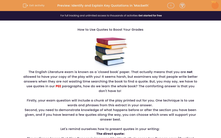How to Use Quotes to Boost Your Grades

The English Literature exam is known as a 'closed book' paper. That actually means that you are not allowed to have your copy of the play with you! It seems harsh, but examiners say that people write better answers when they are not wasting time searching the book to find a quote. But, you may say, we have to use quotes in our PEE paragraphs, how do we learn the whole book? The comforting answer is that you don't have to!
Firstly, your exam question will include a chunk of the play printed out for you. One technique is to use words and phrases from this extract in your answer.
Second, you need to demonstrate knowledge of what happens before or after the section you have been given, and if you have learned a few quotes along the way, you can choose which ones will support your answer best.
Let's remind ourselves how to present quotes in your writing:
The direct quote:
The audience knows that King Duncan is impressed by Macbeth. In scene two Duncan says: "O valiant cousin, worthy gentleman." This suggests that Macbeth is someone who can be trusted and who is loyal to the king.
The indirect (embedded) quote:
At the beginning of the play, Macbeth is presented to the audience with positive descriptions. He is called "brave" by the Captain as well as "valiant" and "worthy" by Duncan. These adjectives build up a picture of a man the king can trust.
The first example is appropriate to use when you can remember a line or phrase, the second is a great way to include single words that you can recall. In this activity, we will identify some key quotes and how to connect them to different topics in the play that you could be asked to write about in an exam.
You should always refer to your own text when working through these examples. These quotations are for reference only.








